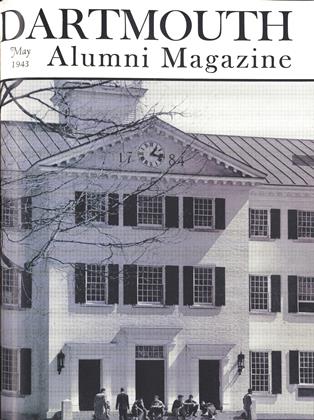THE ENTIRE STUDENT BODY and faculty of the College gathered in Webster Hall on Saturday morning, April 17, for a final convocation before the close of the term and heard President Hopkins speak on "The State of the College," Wiley Hitchcock '44, president of Palaeopitus, presided at the convocation and explained that the gathering had been suggested by the governing council not only to preserve a tradition and provide a substitute baccalaureate exercise for graduating seniors, but also to enable the undergraduates to hear the message on the future of Dartmouth which President Hopkins had been carrying to alumni groups this year.
As the only speaker on the brief, half-hour program, President Hopkins dwelt largely on the present questioning attitude toward liberal arts education and on his own firm belief that Dartmouth and other colleges of its type offer the best hope for education in the future. He reviewed the College's record of preparation for the emergency and its swift putting into operation of carefully laid plans once this country had become an active belligerent in the war, and declared that this example of adaptability was guarantee that Dartmouth in the future would continue to meet any demands made of it.
President Hopkins defined the liberal college as the free college, and declared that its freedom from coercion, its freedom to progress and to seek the realities of life, was in essence the thing which the war was being fought to preserve.
He then summarized the present-day attacks on the liberal arts college, arising largely from the success of technology in the war, and took sharp issue with those who would slough off the liberal heritage of American education or would cram the undergraduate course into the shortest possible time. He praised technological education within its proper sphere, but asserted that those who would make it the sum and substance of American education were approaching Prussian educational theories which brought on the present world conflict. "Every move away from the liberal college is a move toward the Axis," he said.
President Hopkins told the undergraduates of the solicitude of Dartmouth alumni for the continuance of the College, and declared that a like solicitude and a like belief on their part would be the best of all possible preservatives for Dartmouth through the present period. In conclusion, he expressed his own faith in the strengthened usefulness of the College in the post-war years and likened the liberal arts college today to the schools of Athens in the days of Roman conquest.
 View Full Issue
View Full Issue
More From This Issue
-
 Lettter from the Editor
Lettter from the Editor'Round the Girdled Earth
May 1943 -
 Article
ArticleTHE LIBERAL ARTS COLLEGE
May 1943 By W. H. COWLEY '24 -
 Article
ArticleBrief Biographies of Buildings
May 1943 By LEON BURR RICHARDSON '00 -
 Article
ArticleFrom the Mailbag
May 1943 -
 Class Notes
Class Notes1937
May 1943 By JOHN H. DEVLIN JR., FREDERICK K. CASTLE -
 Class Notes
Class Notes1918
May 1943 By ERNEST H. EARLEY, RICHARD A. HOLTON







